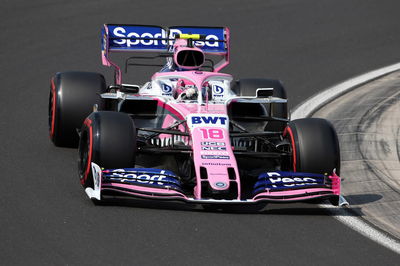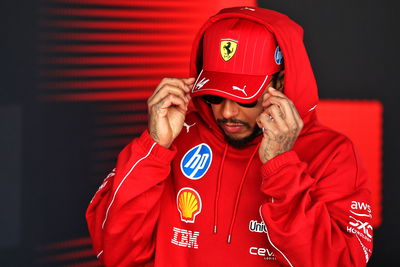The importance of Esports to motor racing’s future
As the Formula 1 grid grows ever-younger and the likes of Max Verstappen, Charles Leclerc, Lando Norris and George Russell – all 21 or younger – taste success, there are growing signs of a generational shift in the sport.
Not only do we now have a brood of media-savvy, children of the internet going to new lengths to engage with fans and attract a new audience, but they have also benefitted from the rise of racing simulations, blurring the lines between the real and virtual worlds.
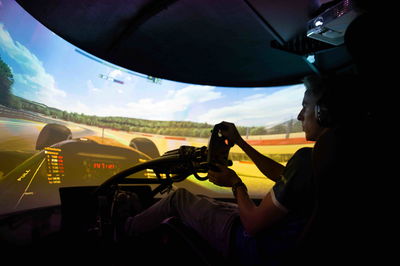
As the Formula 1 grid grows ever-younger and the likes of Max Verstappen, Charles Leclerc, Lando Norris and George Russell – all 21 or younger – taste success, there are growing signs of a generational shift in the sport.
Not only do we now have a brood of media-savvy, children of the internet going to new lengths to engage with fans and attract a new audience, but they have also benefitted from the rise of racing simulations, blurring the lines between the real and virtual worlds.
Verstappen and Norris are particularly prolific in sim racing, often taking part in official events with some of the world’s best virtual teams. The pair took victory with Team Redline in iRacing’s 24 Hours of Spa event (despite Verstappen’s brake pedal failing with 15 minutes to go), and Verstappen was even on his sim racing rig the same night he won the German Grand Prix in July.
“I think it does help me because you are always doing the same thing,” Verstappen said of the benefits of Esports. “If you are in a GT car, you are always trying to get the best out of it and you are always trying to find the right lines, and always working on the setup. You must try to be really consistent because you know the competitors around you are also really, really quick, if not faster.
“For me, it is a fun way and a good way to stay sharp, and on top of everything.”
Even though it wasn’t taking place on a real-life circuit, Norris took the race as seriously as he would any other, knowing his team was up against a stacked field of talented virtual racers.
“It is a proper race,” Norris said. “There’s probably a few thousand people who are racing, four or five people in every team. There were 53 cars I think in our split. So you get a lot of other sim drivers who want to do well and want to beat Max and myself and the top teams, especially because it’s Max and myself!
“It’s nice because a lot of people doubted we could do it. We had two very good teammates who were very good and probably the best at driving on the simulator. But at the same time, they thought we weren’t going to take it seriously, that we were going to crash and do some stupid things. But we didn’t. Everything went very well so I’m happy to show a lot of people wrong.”
RAPID RECENT GROWTH
Esports’ rising profile in motorsport isn’t solely down to the escapades of Norris and Verstappen, with numerous racing series and teams have created their own events and championships. Formula E held an e-race as a non-championship round back in 2017 with a $1 million prize pool, while the FIA World Endurance Championship also has an Esports series, holding finals at the 24 Hours of Le Mans last June.
Most notably in Formula 1, the official Esports series has gone from strength to strength. Currently in the early stages of its third season, the championship now enjoys support and involvement from all 10 teams, all of whom are heavily engaged in their Esports programmes. One of the strongest examples comes at Mercedes, where its Esports facility is set up adjacent to its full F1 simulator.
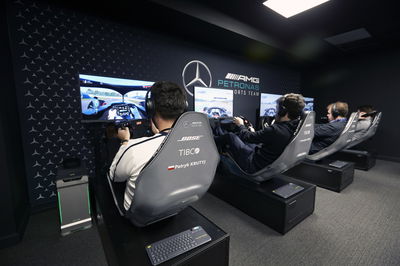
As well as being part of the full F1 Esports series, McLaren has been running its own schemes – ‘World’s Fastest Gamer’ and ‘McLaren Shadow’ - for three years now, helping the likes of Rudy van Buren and Igor Fraga further their real-world racing careers and become fully-fledged parts of the team. It has all gone a long way to dispel the idea of sim racers simply sitting on their sofas at home, aided by the close crossover of skills using a steering wheel and controlling a car, be it virtual or real.
“Because of how racing games work versus traditional Esports titles, it’s a much more physical endeavour. People are surprised by the athleticism of the guys,” explained Ben Payne, McLaren’s head of Esports (itself a role reflecting the growing significance of Esports in F1).
“These guys are sat in sleds for three or four hours in the World’s Fastest Gamer finals, and they come out and they’re pooped because they’re doing laps and laps and laps. It takes its toll.
“These guys are athletes. We’re not buttering it up as a marketing language, they’ve been putting in six or seven hours a day of practice, and we’re putting them through a lot of this human and cognitive work with our human performance team as part of McLaren Applied Technology’s DNA programme.
“It is trying to break down that stigma of what a gamer or an Esports player is. I think we have a great programme and a shop window to show that these guys are as much athletes as their real-world counterparts.”
TRANSFERABLE SKILLS TO THE REAL WORLD
As well as removing the stigma, the growth of Esports is also helping to remove some of the barriers to entry in motorsport. With young drivers requiring large budgets to simply make it through go-karting and reach the lowest rungs of single-seaters, the much lower costs of simulator setups can help open up doors that would otherwise be slammed shut.
“Karting and single-seater racing is expensive and tough to get out the other end of. We can cheat the system via gaming as a way of sourcing talent,” said Payne.
“McLaren Shadow is about filling seats on our Esports team at a fundamental level. We’re lucky at McLaren where we have opportunities we can give these guys based on their appetite to participate. [McLaren Racing CEO] Zak Brown has said he has every confidence in 10 years there’ll be someone sat on the grid in Formula 1 who has come from a gaming background as opposed to traditional karting.”
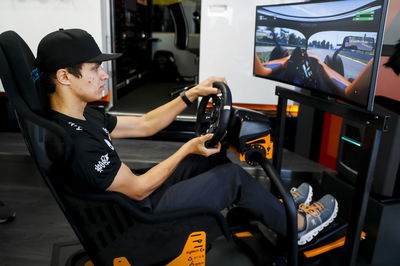
The growing Esports schemes have already borne fruit in this regard. Two-time F1 Esports champion Brendon Leigh has been racing in the Formula Ford 1600 series this year, entering with no previous real-world racing experience and quickly matching his counterparts for pace. The inaugural McLaren World’s Fastest Gamer winner, Rudy van Buren, joined the Porsche Supercup grid at Hockenheim and has been in Germany’s national Carrera Cup series this year, having previously put his racing ambitions on hold due to a lack of budget despite a successful career in go-karting.
The lines between the virtual and real racing worlds were blurred completely at the Race of Champions in Mexico back in January. The event first had Esports presence in 2018 as van Buren teamed up with McLaren colleague Enzo Bonito for the Nations Cup. Bonito returned in 2019, this time alongside British driver James Baldwin, who won the eROC event that formed part of the weekend at the Autodromo Hermanos Rodriguez.
Baldwin and Bonito were also both able to claim victories over their real-world counterparts, collectively beating stock car driver Ruben Garcia, Formula E champion Lucas di Grassi, and three-time Indianapolis 500 winner Ryan Hunter-Reay. The Esports drivers had held their own, even piquing the interest of their more-established rivals on the day.
“Some were more receptive than others,” said Baldwin. “Sebastian Vettel was a very nice guy. When I left, I went around and said goodbye to all the drivers, and Sebastian then asked about how F1 Esports works. I had a 10-minute conversation with him about F1 Esports, how the rest of it all works, why there are different championships and trying to explain that to him, because he didn’t really understand. The fact that he was interested was enough for me.
“Lucas di Grassi? Him maybe not so much. He was a nice guy when I was out there, but I think it shocked him as well as other people that Enzo was so fast. I knew Enzo was going to be fast. The skills you learn in sim racing, you learn how to be absolutely perfect on a lap, so accurate, because you just go at it time and time again, and reset, reset, reset.
“It was scary to start with, but an honour to be around them by the end of it, and I can’t wait to see a lot of the same faces next year.”
Baldwin’s is another story of a racing driver given a second shot through Esports. After doing karting, he raced in Formula Ford for half a season in 2015 before running out of budget, prompting him to move into engineering. He kept his racing ambitions alive through sim racing, working his way up the ranks before attracting the attention of Veloce, a professional Esports team with a focus on motorsport.
“THE REAL SPORT NEEDS ESPORTS”
Set up in January 2018, Veloce has applied a real-world racing approach to the Esports scene. It was co-founded by Rupert Svendsen-Cook, Jack Clarke – both of whom raced professionally in single-seaters – former football agent Jamie MacLaurin, and two-time Formula E champion Jean-Eric Vergne. The team operates out of a hub in London where it has several simulators, allowing drivers on its books (such as Baldwin) to hone their skills at any time across several titles and prepare for upcoming competitions. It also powers Alfa Romeo’s Esports team for the official F1 series.
“I speak to a lot of drivers in terms of recruiting them to our team,” said MacLaurin. “Actually having a base and having something that they can touch and feel, see the simulator and see the work that we do every day, it’s massive, because it gives them security in the fact that we’re real. We’re not just a name.”
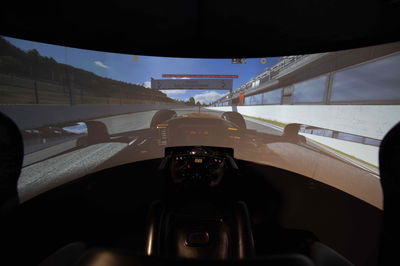
Baldwin said the Veloce facility and setup was an “immense” help in his preparations for the Race of Champions: “There’s always someone you can go to for advice. When you’re practising alone all the time, like I was for eROC, to go to others here and get them to watch my driving, you know you’re going to get some answers.
“Obviously the HQ’s a good place with the facility they have. We can talk things through there, and their plans are massive. I personally think it’s the best team to be with.”
Veloce’s reach goes beyond competitive Esports, though. The team also works with a roster of content creators to produce regular YouTube videos that are helping take motorsport – even in its virtual form – to a whole new audience.
“The good thing we’re seeing more and more of is that people who are watching our content are not necessarily motorsport fans,” said MacLaurin. “They just come across Esports content that they come across on YouTube or Twitch, and consequently they end up watching league racing online or they might switch on the TV and watch the real thing.
“I think the more that happens, the better it is for the real sport. I think when we first started, we thought ‘we need the real sport to make this work’. Actually, it’s the complete opposite: the real sport needs Esports. That’s genuinely what I believe.
“On the content creation side, that’s where we have within our stable over 35 million views a month from our talent. The more that people engage with it and the more that people watch it, I’d like to think that even if a small percentage cross over to the real sport, it’s still an improvement.
“If we can push people towards watching a Formula 1 race or a BTCC race, or whatever it ends up being, then we have achieved something that we set out to do in the very beginning.”
Motorsport may be looking to Esports to help create more opportunities for drivers and remove many of the obstacles some top talents struggle to overcome, but it is also critical for its fanbase moving forward.
With young people spending more and more time watching non-traditional forms of media such as YouTube, there is a massive audience offering a lucrative opportunity. It is one motorsport needs to tap into if it wishes to remain relevant.
Esports wasn’t widespread in motorsport 10 years ago – but in another 10 years’ time, motorsport could be unthinkable without its contributions both on and off the grid.
